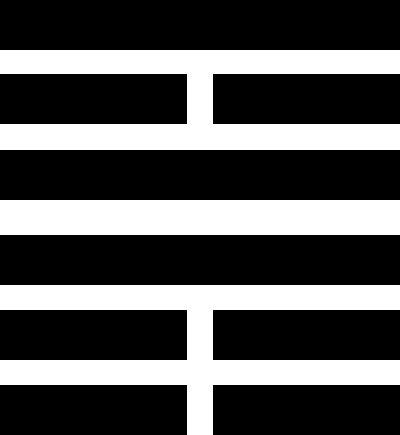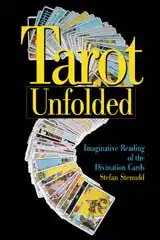
Upper trigram: Li The Clinging, Flame
Lower trigram: Kên Keeping Still, Mountain
The Judgement
The Wanderer. Success through smallness.
Perseverance brings good fortune
To the wanderer.
The Image
Fire on the mountain:
The image of The Wanderer.
Thus the superior man
Is clear-minded and cautious
In imposing penalties,
And protracts no lawsuits.
The Lines
These texts apply only for the lines that were marked, when the hexagram was cast. Note that the lines are counted from the bottom up.
The bottom line marked means:
If the wanderer busies himself with trivial things,
He draws down misfortune upon himself.
The 2nd line marked means:
The wanderer comes to and inn.
He has his property with him.
He wins the steadfastness of a young servant.
The 3rd line marked means:
The wanderer's inn burns down.
He loses the steadfastness of his young servant.
Danger.
The 4th line marked means:
The wanderer rests in a shelter.
He obtains his property and an ax.
My heart is not glad.
The 5th line marked means:
He shoots a pheasant.
It drops with the first arrow.
In the end this brings both praise and office.
The top line marked means:
The bird's nest burns up.
The wanderer laughs at first,
Then must needs lament and weep.
Through carelessness he loses his cow.
Misfortune.
The interpretations above and comments below are from Richard Wilhelm's version of the I CHING.
Comments on the Hexagram
The mountain, Kęn, stands still; above it fire, Li, flames up and does not tarry.
Therefore the two trigrams do not stay together. Strange lands and separation
are the wanderer's lot.
The Judgement
When a man is a wanderer and stranger, he should
not be gruff nor overbearing. He has no large circle of acquaintances,
therefore he should not give himself airs. He must be cautious and reserved;
in this way he protects himself from evil. If he is obliging toward others, he
wins success.
A wanderer has no fixed abode; his home is the road. Therefore he must
take care to remain upright and steadfast, so that he sojourns only in the
proper places, associating only with good people. Then he has good fortune
and can go his way unmolested.
The Image
When grass on a mountain takes fire, there is bright light. However, the fire
does not linger in one place, but travels on to new fuel. It is a phenomenon
of short duration. This is what penalties and lawsuits should be like. They
should be a quickly passing matter, and must not be dragged out indefinitely.
Prisons ought to be places where people are lodged only temporarily, as guests
are. They must not become dwelling places.
The Lines
The bottom line marked
A wanderer should not demean himself or busy himself with inferior things
he meets with along the way. The humbler and more defenseless his
outward position, the more should he preserve his inner dignity. For a
stranger is mistaken if he hopes to find a friendly reception through lending
himself to jokes and buffoonery. The result will be only contempt and
insulting treatment.
The 2nd line from the bottom marked
The wanderer her described is modest and reserved. He does not lose touch
with his inner being, hence he finds a resting place. In the outside world he
does not lose the liking of other people, hence all persons further him, so that
he can acquire property. Moreover, he wins the allegiance of a faithful and
trustworthy servant-a thing of inestimable value to a wanderer.
The 3rd line from the bottom marked
A truculent stranger does not know how to behave properly. He meddles in
affairs and controversies that do not concern him; thus he loses his resting
place. He treats his servant with aloofness and arrogance; thus he loses the
man's loyalty. When a stranger in a strange land has no one left on whom he
can rely, the situation becomes very dangerous.
The 4th line from the bottom marked
This describes a wanderer who knows how to limit his desires outwardly,
though he is inwardly strong and aspiring. Therefore he finds at least a place
of shelter in which he can stay. He also succeeds in acquiring property, but
even with this he is not secure. He must be always on guard, ready to defend
himself with arms. Hence he is not at ease. He is persistently conscious of
being a stranger in a strange land.
The 5th line from the bottom marked
Traveling statesman were in the habit of introducing themselves to local
princes with the gift of a pheasant, killing it at the first shot. Thus he finds
friends who praise and recommend him, and in the end the prince accepts
him and confers an office upon him.
Circumstances often cause a man to seek a home in foreign parts. If he
knows how to meet the situation and how to introduce himself in the right
way, he may find a circle of friends and a sphere of activity even in a strange
country.
The top line marked
The picture of a bird whose nest burns up indicates loss of one's resting place.
This misfortune may overtake the bird if it is heedless and imprudent when
building its nest. It is the same with a wanderer. If he lets himself go,
laughing and jesting, and forgets that he is a wanderer, he will later have
cause to weep and lament. For if through carelessness a man loses his cow-
i.e., his modesty and adaptability-evil will result.
Further Reading
Here I add some perspectives on this hexagram, as well as other methods to read its meaning, in additon to what Richard Wilhelm derives from it above.
Meaning of the Trigrams Combined
Each hexagram combines two trigrams, making one the upper and the other the lower. The meaning of the hexagram is mainly derived from that combination. Here's what it means for this hexagram:
Flame upon Mountain
This part of the text is being edited. It will be added shortly.
Compare to the Reversed Trigrams
It's common to compare a hexagram to the one where the lines are the opposite: a full line is broken and a broken line full. But I find it much more interesting to compare hexagrams with the trigrams reversed: the upper trigram becomes the lower, and the lower trigram becomes the upper. That deepens the understanding of the trigrams at work when they're not identical. Click the image to see what it means for the two trigrams of this hexagram:

The hexagram with the trigrams reversed
Compare to the Reversed Lines
You can also compare this hexagram to its opposite according to the six lines, where each broken line is full, and vice versa. In some cases it leads to the same hexagram as the one where the trigrams are switched. Here is the hexagram with reversed lines (click it to get to its webpage):

Hexagram with opposite lines
Click the header to read more about the eight trigrams that are combined into the 64 hexagrams.
The 64 I Ching Hexagrams
An I Ching hexagram is composed of two trigrams. Each of the 64 hexagrams has its own name, meaning, and divinatory text. Here they all are, in the traditional order. Click on the image of an I Ching hexagram to get to its webpage.
Use the Facebook field on some of these web pages to comment the I Ching or this website.






































































